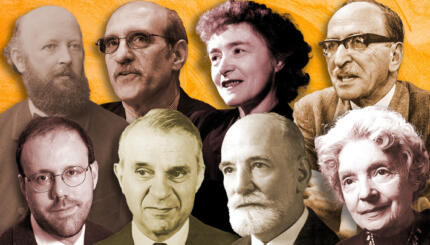Dara Horn has never been a writer who shies away from strong imagery. Her first novel, In the Image, features a catatonic flood that wrecks a New Jersey town. In The World to Come, an antisocial bachelor at a Jewish singles event in a museum mopes in a corner and inadvertently steals a framed Chagall painting.
All Other Nights
— which comes out in paperback on March 10 — is no exception. A Passover story about slavery and the American South, plotting with his future sisters-in-law to marry an “uppity woman”-type sister, simultaneously running away from one destiny while sliding seamlessly into a destiny of a very different caliber — there are grand themes and epic storytelling, but Nights is about as subtle as the Civil War itself.
Jacob, a young man from New York, is sent across the Mason-Dixon Line at the height of the war as a spy with instructions to pay his uncle and aunt a visit. The Southern Rappaports are hosting a Passover seder, and Jacob has been ordered to poison his uncle, a conspirator in a plot to assassinate President Lincoln.
The night of the seder, the family receives an unexpected visitor in the person of Judah P. Benjamin, the Jewish second-in-command of the Confederacy, and Jacob is forced to decide just whom he’s expected to make his move on. Just when we think it’s a simple matter of
Inglourious Basterds
-type fan fiction, things become a lot more complicated. For one thing, Benjamin doesn’t simply die. For another, that’s just the first fifty pages — a teaser for a much longer and more intricate plot that dwarfs the moral quandaries of assassinating your own uncle.
Shortly after All Other Nights came out, Horn casually mentioned to me that she was afraid her Torah metaphor was too blatant — “After all,” she laughed to herself, “I named my main character ‘Jacob’.” For a moment, I was stunned. It actually hadn’t occurred to me at all — Jacob in the book, like Jacob in the Good Book, was part of an arranged marriage; was indentured to his father-in-law in a work arrangement for years; and was, as a child, when his mother dressed him up, definitely guilty of more than one instance of espionage.
Of course, she takes liberties. Not the least of which is that this Jacob doesn’t marry any of the sisters of his beloved — instead, he charms them into seducing the withdrawn, sly, and uncrackable Eugenia Levy, alleged spy for the Confederacy. And, when their marriage starts, the book — for the sixth or seventh time, in what seems to be an unbreakable marathon of energy — kickstarts into yet another beginning.
The weirdest thing about All Other Nights, at least compared to its predecessors, is its linearity of plot. In another binding — and with characters with names like “Philip Mordecai Levy” and “William Wm. Williams” and, yes, “Eugenia” — it could read as a historical thriller, or even a romance novel, instead of literary fiction.
The story is anything but straightforward. Luxuriously plotted and extensively researched, the novel shares snapshots of a fully-realized 19th-century world, from the most minute of details of food and architecture to hints of a suspected (but never proven) conspiracy to assassinate Lincoln. In Horn’s author’s note at the end, she talks about a summer spent as a fact-checker at American Heritage Magazine, and of being warned that “Civil War buffs are to be feared the most” — and she seems to have pacified even them.
The thing is, All Other Nights works on almost every level you can run it through, from philosophy to action to political thriller — and yes, even as a romance novel (although a sort of depressive, masochistic one, at times). It doesn’t have the singleminded brilliance of The World to Come, but it’s not supposed to be that kind of book. Horn is the rare novelist, Jewish or not, who’s not content to repeat a past triumph with slight variations, but searches as a writer to find something uniquely new and undiscovered. It’s not a surprise that she’s succeeded in the elusive Civil War genre with her first try. It’s the same reason that I recommend Horn’s books to friends and feel it necessary to add the caveat that “it’s not that she’s a Jewish novelist, she’s just a damn good one” — to Dara Horn, the story is paramount, and all else falls in its wake. For some people, that’s what war does, and for others, that’s what religion does. For her, it’s all about the ride.
Torah
Pronunced: TORE-uh, Origin: Hebrew, the Five Books of Moses.


